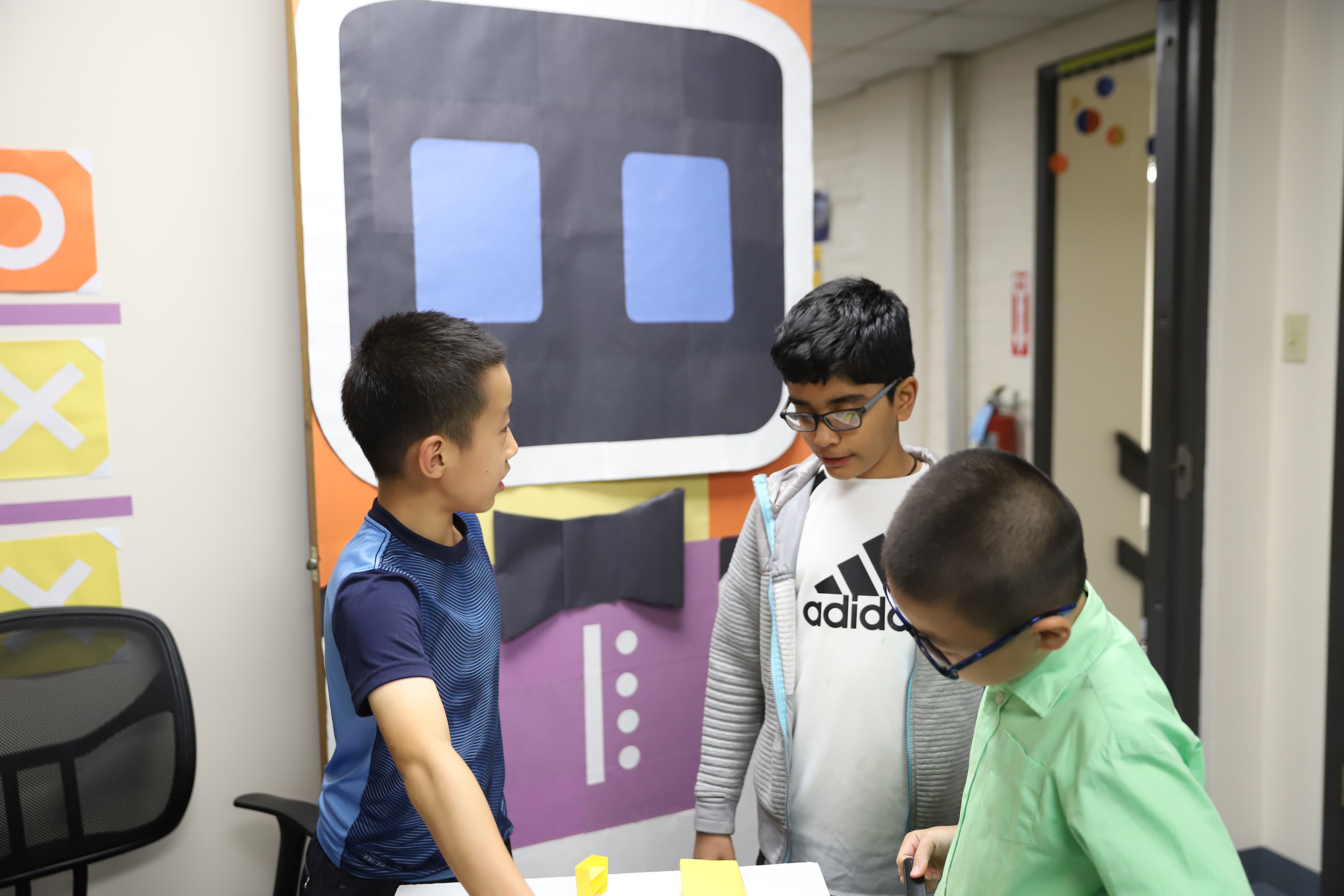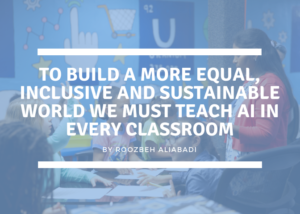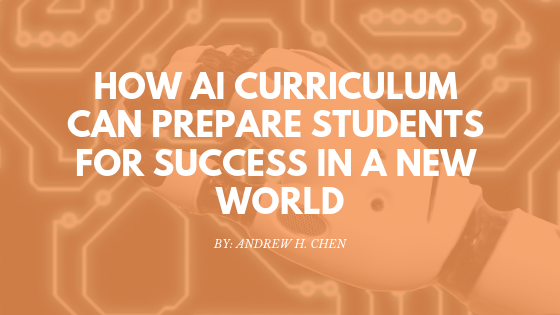Learning Artificial Intelligence is About Developing All Types of Intelligence
By: Roozbeh Aliabadi (ReadyAI)
Standardized tests dominate our school systems in many countries and around the world. Today we are teaching our children that we most value a very narrow definition of intelligence and knowledge. For example the ability to solve word problems about train distance or be able to name the end of World War II treaty on a multiple-choice test.
Human intelligence is broad and surely very complicated. Today we are all living in an artificial intelligence age, where machines are far more capable of beating IQ tests and learning any knowledge-based concepts. We might be just setting our children up to be defeated by technology very soon.
I believe there is a real risk of dumbing ourselves down, mainly because we measure intelligence in very limited ways and we are typically very impressed by the sort of intelligence of our technologies, from iPhone to Amazon Echo, can perform.
Therefore to make sure that our children don’t just turn into robot way of thinking, we must completely redefine or perhaps reimagine intelligence. At ReadyAI as we develop programs for K-12 AI education we continuously think about intelligence and its various meanings. We believe by learning AI early on in the educational journey and using AI, we can help our children grow and measure human intelligence and knowledge in various kinds and further to better prepare our students for a workplace that demands continuous evolution and learning.
Through AI education, collectively we must also attempt to redefine intelligence in our classrooms. We have seen first hand as we have interacted with students in various classes across the country, and further identified the varieties of intelligence that kids will need to thrive in the future. So let’s look at various types of intelligence together.
We have, of course, interdisciplinary academic intelligence. This is the capacity to tie subjects together rather than examining them in silos. We also have social intelligence, which is cultivating an awareness and appreciation of our own emotions and how we manage that in groups. It is truly something that people can surpass robots in.
There are also various so-called meta-intelligences. For example Meta-knowing, which is our connection to knowledge and information. Or simply, do people really know where knowledge comes from? Do students see it as something they are given and they have to learn, or do they realize it is something they form and is in a form contextual? Students that develop this kind of intelligence understand what makes good evidence, and how to make decisions based on that data.
We also have Meta-cognition, which is knowing who we are and improving and adjusting our cognitive process. I have personally learned it the hard way. For example, I know that I am a procrastinator and need to write things down to learn them, then I should better and not wait until few hours before a final exam to try and re-write all my notes.
There is also Meta-subjective intelligence, which is understanding our emotions and their relationship to our training and well-being. Motivation is a crucial part of development.
There is also meta contextual intelligence, which is about the dynamic context in which learning takes place – not just in a class, but with people, things and places. We need a constant reminder that our intelligence is not only in our head or brain. We have seen this first hand with students that attended WAICY 2018, there is a growing volume of evidence that context and circumstances are vast. This context is something AI can’t do well, at least for now.
I believe the most important kind of intelligence is true observed and perceived self-efficacy, which is our ability to evaluate our personal skills and abilities. We can predict whether we are likely to be successful at doing a task, whether we are capable?
The truth is that humans are pretty bad at predicting their own performance. Psychologist and even economist have explained we are likely to have overconfidence, among many other biases. This is where AI becomes growingly necessary.
At ReadyAI, we think AI is a powerful means to open up the black box of learning and education, mainly by giving a deep, fine-grained understanding of when and how learning occurs. We believe AI learning allows students to better develop this broader range of intelligence, in part because AI could help to measure quality beyond knowledge, including collaboration, tenacity, confidence, determination, and motivation. More important, it would also allow schools to replace one-time tests used to monitor and evaluate students in the near future. Instead, students could be examined on a continuous basis with a computer, tablet and an AI robot, as we have been doing with AI-in-a-Box. Equipped AI-in-a-Box and our teaching AI mechanism, we give students and teachers with a more detailed picture of what they can and cannot do. Students would, therefore, have more efficient ways to improve. We believe in this ecosystem of learning and teaching AI because more times seeing some real evidence for yourself about how students are doing is very instructive to shed light on what we are doing. Through AI learning ecosystem, we would also free up the teacher to focus on making sense of the data and working on critical students issues like motivation and perseverance. Ok, while we don’t believe AI can fully measure any of the intelligence, but it can help us to improve at most of them.
At ReadyAI, our work with various community centers, schools, after-school clubs; we have witnessed first hand how AI is helping to improve learning in very profound ways. Through ReadyAI’s project-based learning ecosystem, we have examined and measured collaborative problem-solving, a skill that has been much-touted as needed for the modern workplace. The reality is that is is impossible for a single teacher to keep complete tabs on which students are working well together during classroom small-group activities. During various ReadyAI workshops and WAICY2018, we have taped students hand movements and head orientation to measure how effectively students were working together. The discovery means was then cross-checked by humans who judged whether the groups were working collaboratively or not. One of the goals of ReadyAI through WAICY was to build evidence of social interaction, which is crucial of successful collaborative problem-solving. This evidence can also be used to form a mechanism that would signal to teachers which groups need their attention, allowing the teacher to use their time more efficiently.
At ReadyAI we believe in developing every kind of intelligence through real AI learning system. We believe there is a way to create a range of knowledge and intelligence that goes beyond AI, too. We do think that students can build their intelligence by learning AI itself.
I don’t believe schools will let go of high-stakes, academic testing anytime soon. But there is a growing acceptance that the exam systems and standardized test culture are broken. This approach mainly rewards students for repeating information rather than making meaning from. Through AI learning and project-based learning, we believe we can in not such a distant future, have some viable options to replace some test. This approach might go down the road become a realistic alternative to some exams.
At ReadyAI we are excited by the possibility we have through AI education in our broader education system value chain. Because if we can accept that we need to change the assessment system, at least partially, then it opens the door to that radical rethinking about what the education system is for.
Our core belief is that students around the world should have the right to be AI-educated and at ReadyAI we are empowering them to thrive intellectually, emotionally and economically alongside Artificial Intelligence. We can do this together.




Very interesting info !Perfect just what I was looking for!
I am glad to be one of several visitors on this great website (:, thankyou for putting up.
I like this website because so much utile stuff on here : D.